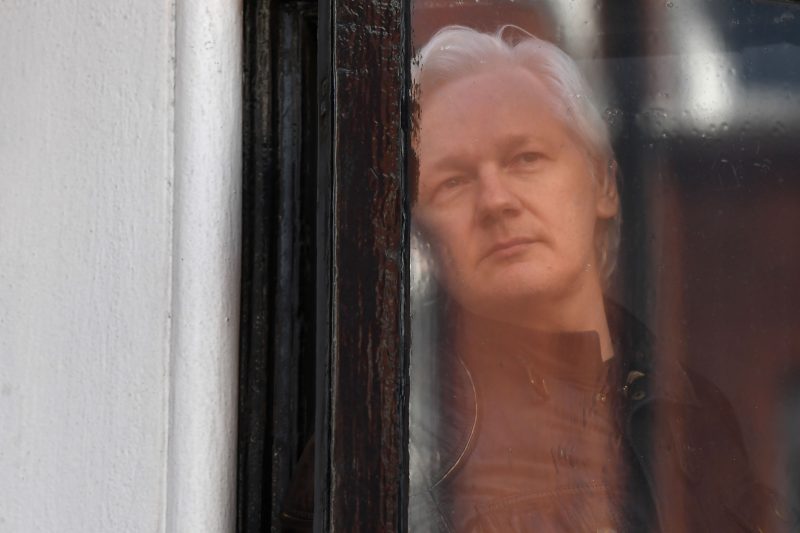Julian Assange: Transparency icon or enemy of the state?
Wikileaks founder Julian Assange likens his stay at the Ecuadorian embassy in London to living on a space station (Justin TALLIS)
London (AFP) – A heroic campaigner for openness, or an enemy of the US state trying to avoid justice: after a decade in the limelight, WikiLeaks founder Julian Assange remains an evasive and polarising figure.
The 47-year-old Australian is again in the headlines after Ecuadoran President Lenin Moreno said he had “repeatedly violated” the conditions of his asylum at the country’s embassy in London.
Assange, who won fame as the frontman of the whistleblowing website as it exposed government secrets worldwide, has lived in the embassy since seeking refuge there in 2012 to avoid extradition to Sweden.
He was applauded by transparency and anti-war campaigners for revealing the death of civilians, torture and clandestine military operations with the release of 500,000 US documents on the Iraq and Afghan wars.
But the United States and its allies accused him of risking lives by revealing information on sources, intelligence techniques and key infrastructure sites, with internal documents showing the US military considered him an “enemy”.
Human rights groups and newspapers that once worked with Assange to edit and publish the war logs were also horrified when WikiLeaks dumped the documents unredacted online, including the names of informants.
He was arrested in Britain in December 2010 on allegations of sexual assault and rape in Sweden, claims he strongly denied, saying they were politically motivated.
Before the claims were dropped in 2017, Assange expressed fears that any extradition to Sweden could see his eventual transfer to the United States to face trial for the leaks.
He took political refuge in Ecuador’s embassy in London in 2012, but his hosts have grown increasingly irritated by his interventions on foreign affairs.
The Ecuadoran government eventually suspended his internet access last year, saying he had breached “a written commitment… not to issue messages that might interfere with other states”.
There are also questions about his relationship with Russia, with WikiLeaks identified in Robert Mueller’s probe into interference in the 2016 US election.
According to US Attorney General William Barr’s summary of his report, Mueller found that Russian government actors hacked Hillary Clinton’s campaign “and publicly disseminated those materials through various intermediaries, including WikiLeaks”.
– Exposing ‘truth’ of war –
Born in Townsville, Queensland, in 1971, Assange has described a nomadic childhood and claims to have attended 37 schools before settling in Melbourne.
As a teenager he discovered a talent for computer hacking, and while has pled guilty to 25 such offences, he has only ever walked away with fines.
He created WikiLeaks in 2006 with a group of like-minded activists and IT experts, to provide a secure way for whistleblowers to leak information.
A confident speaker, he became its figurehead — and a lightning rod for criticism.
The most damaging leaks emerged in 2010, beginning with a video showing a US military Apache helicopter firing on and killing two journalists and several Iraqi civilians on a Baghdad street in 2007.
It was followed by more than 90,000 classified US military files from the Afghan war, 400,000 from Iraq, and in November that year, around 250,000 US diplomatic cables covering almost every country in the world.
– Facing justice –
Although the sexual assault claims against him in Sweden were dropped, Assange still faces arrest by British police for having jumped bail, so has stayed in Ecuador’s embassy near Harrods.
He has described it as like living in a space station — he exercises on a treadmill and uses a sun lamp to make up for the lack of natural light.
In 2016 a UN panel declared that he had been detained arbitrarily, but critics have said his concerns of extradition to the US are unfounded. They say he is simply hiding from justice.
“WikiLeaks was founded on exposing those who ignored the rule of law. Surely its editor-in-chief should recognise his duty to see it upheld,” The Guardian newspaper, which once worked with him to publish the leaks, wrote in 2016.
Assange did, however, find growing support among previous critics on the right wing and online supporters of Donald Trump. That happened when the US government institutions with which he has been locked in battle also began to investigate the US president.
“He is well aware that I thought he was waging war on the United States,” said Fox News anchor and Trump favourite Sean Hannity.
“My opinion of it has evolved largely because of what I have seen that he has done in 10 years.”
Disclaimer: Validity of the above story is for 7 Days from original date of publishing. Source: AFP.


